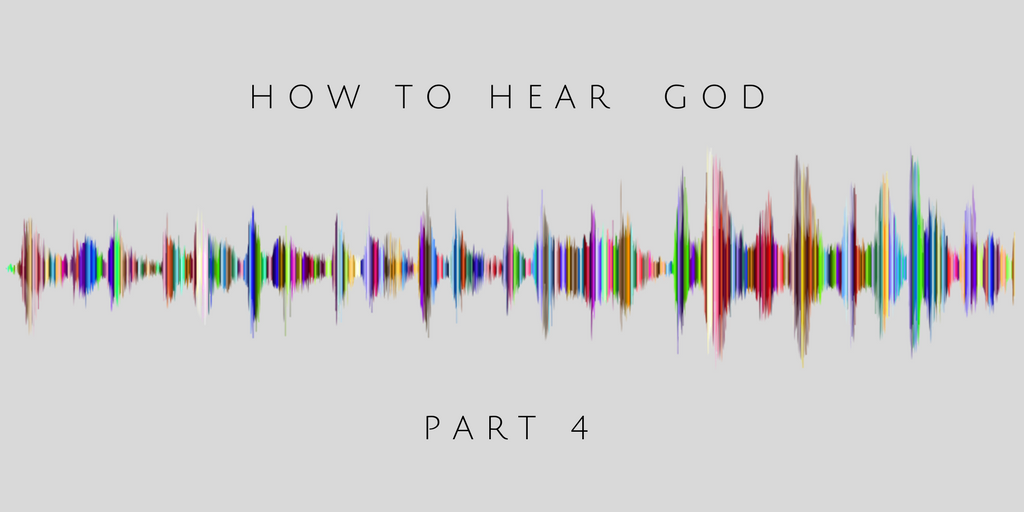
Wouldn’t it be odd for a child to open all her presents on Christmas morning and then go into her room, look into the mirror, and give herself a high five for being so deserving of such great gifts?

Should you make promises to God? It’s tempting to make a promise to God after you sin in some terrible way, “God, I promise I will never do that again if your forgive me.” Or when you want something desperately, it’s easy to say something like, “God, I promise I will serve you my whole life if you do this one thing for me.”
To cut right to the answer for the question, “Should you make promises to God?” the answer is “No.” Christianity is not about making promises to God. Christianity is about relying on the promises of God.

In this “How to Hear God” series, we have talked about the three most common ways to hear God’s voice: Through his word, through the Holy Spirit’s impressions on your heart, and through the circumstances of your life.
In closing we must acknowledge that sometimes, despite out best efforts and methods, we can find it difficult to hear what God is saying to do. So what should you do when you cannot hear the voice of God? What should you do when you don’t have clarity on his will for you?
Read two free sample chapters from my newest book, Intertwined: Our Happiness Is Tied to God’s Glory (Two Free Sample Chapters PDF)

As children we imagined we would find the perfect spouse, the perfect job, buy the perfect house, go on perfect adventures, and well . . . have the perfect life. Somewhere along the way, however, we quickly realized we will experience many things on this earth, but perfection is certainly not one of them.

In our world, when someone seeks to exalt themselves, they are usually doing it at the expense of pushing others down. But God is not like this. He’s not like kids on a playground.

(Note: The names and minor details of this story have been changed to protect people’s identities.)
Jose was a drug addict. Although much older now and obviously a different man, his rough, tattooed exterior and muscular build allowed for an easy visual of his former life of crime. By his own admission, he had lived a crazy existence full of violence, quick pleasures, and self-centeredness. Eventually his rebellious ways brought him to jail. It was there God found him. The prison chaplain led Jose to accept Christ and he never looked back. He even went to seminary and began a career in counseling other men who had fallen into the same traps he had.

For you created my inmost being; you knit me together in my mother’s womb. I praise you because I am fearfully and wonderfully made; your works are wonderful, I know that full well.-Psalm 139:13,14
For who makes you different from anyone else? What do you have that you did not receive? And if you did receive it, why do you boast as though you did not?-1 Corinthians 4:7

Why does God forgive us? He can forgive us because of the sacrifice of Jesus. But he chooses to forgive us because he is love and because he loves us.
Why should we forgive others? We can forgive others because of the sacrifice of Jesus. And we should choose to forgive because to be God’s child is to reflect his loving image. If we don’t forgive others their sins, then God will not forgive ours because this proves we have not become his children through grace (Matthew 6:14).

If we don’t have tears in our eyes and a deep grief in our hearts when we talk about hell, we are not truly grasping even the smallest percent of its terror.
In my human limitedness, I despise the idea of people going to hell for eternity. But as Augustine said, “If you believe what you like in the Gospel, and reject what you don’t like, it is not the Gospel you believe, but yourself.”
The Bible clearly states that heaven and hell are both real and eternal (Deuteronomy 32:22, Psalm 9:17, Matthew 10:28, John 3:16, 14:2, Revelation 20:10, 15). Therefore if I choose to believe the Bible, I must also believe in hell, no matter how disturbing it may be to me.
As Christians, most of us accept the truth about hell and yet still struggle with the emotions triggered by this biblical reality. “Why, God? Why did you create such a horrible place? This seems so cruel, so unnecessary. An eternity of torture? I thought you were a God of love?”
Anytime you ask a question that starts with “Why does God . . .” you can always answer with, “For his glory.” Everything God does, he always does for his honor and fame. Therefore to answer “Why does God send people to hell?” we must actually ask, “How does hell glorify God?”